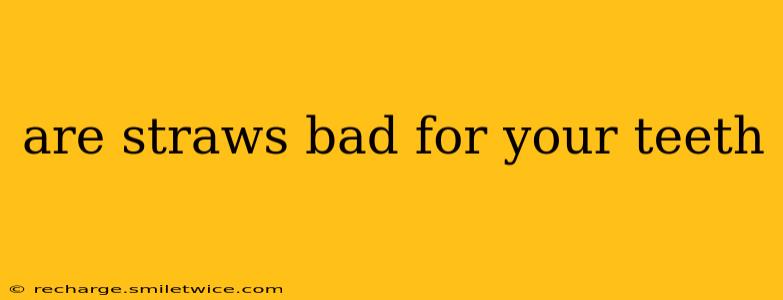Are Straws Bad for Your Teeth? A Comprehensive Look at the Oral Health Impact
The question of whether straws are bad for your teeth is more nuanced than a simple yes or no. While straws can offer some benefits, they also present potential drawbacks for your oral health. This comprehensive guide explores the pros and cons, helping you make informed decisions about your beverage consumption habits.
Do straws protect your teeth from staining?
This is a common misconception. While straws can help reduce staining on your front teeth by diverting liquids away from the enamel, they don't eliminate the risk entirely. Highly pigmented drinks like coffee, tea, and red wine can still stain your teeth, even when consumed through a straw. Furthermore, the back teeth are still exposed to the liquid, potentially leading to staining in those areas. Therefore, while straws might offer some protection, they aren't a foolproof method of preventing staining.
Can straws cause cavities?
This depends on several factors. Straws themselves don't directly cause cavities. However, the type of beverage consumed through a straw plays a crucial role. Sugary drinks, even when consumed through a straw, can contribute to tooth decay. The sugar lingers in the mouth, feeding bacteria that produce acids which erode tooth enamel. This is particularly true if the straw directs the liquid to the back of the mouth, where it's harder to reach with brushing and flossing. Therefore, it's not the straw itself but the content of the drink that contributes to the cavity risk.
Are there different types of straws that affect teeth differently?
The material of the straw has a minimal impact on your teeth. The main concern revolves around the liquid being consumed. However, reusable metal or glass straws are generally considered better for the environment than disposable plastic options.
What are the best ways to prevent tooth damage from drinking?
The most effective way to protect your teeth is to:
- Limit sugary and acidic drinks: These are the primary culprits behind tooth decay and staining.
- Rinse your mouth with water after consuming sugary or acidic drinks: This helps wash away sugar and acid residue.
- Brush and floss regularly: This removes food particles and plaque, preventing the buildup of harmful bacteria.
- Consider using a fluoride mouthwash: Fluoride helps strengthen tooth enamel and protect against decay.
- Visit your dentist regularly: Regular checkups and professional cleanings are crucial for maintaining optimal oral health.
Are reusable straws better for my teeth?
Reusable straws, regardless of material (metal, glass, silicone), don't inherently impact your teeth any differently than disposable straws. The critical factor remains the beverage you consume. The environmental benefit of reusable straws is undeniable, but this doesn't directly translate to improved oral health. Proper cleaning of reusable straws is vital to prevent bacterial growth.
In conclusion, straws themselves aren't inherently "bad" for your teeth. The impact on your oral health largely depends on what you're drinking and your overall oral hygiene practices. Focusing on a balanced diet, regular brushing and flossing, and limiting sugary drinks are far more effective in protecting your teeth than solely relying on straws. Maintaining good oral hygiene habits and regular dental visits are key to maintaining a healthy, beautiful smile.
